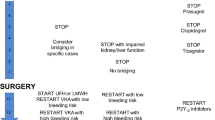Summary
Diabetes has significant implications for cardiac surgery. It is not only a major risk factor for coronary heart disease but also increases the risk for cerebrovascular complications during heart surgery. Surgical technique is pivotal for the outcome. “Off-pump“ surgery carries a lower risk for stroke than conventional heart surgery. When a stroke happens, diabetes plays also a major role for the final outcome. Initial blood glucose levels during a stroke and final outcome are highly correlated. Consequently, patients with ischemic stroke after cardiac surgery should be treated according to the current criteria for stroke treatment. This includes strict monitoring of blood glucose level and avoidance of hypo- as well as hyperglycemia.
Zusammenfassung
Das Vorliegen eines Diabetes mellitus hat weitreichende Konsequenzen für die Herzchirurgie. Der Diabetes ist nicht nur ein Risikofaktor für die koronare Herzerkrankung, sondern erhöht auch das Risiko für zentralnervöse Komplikationen bei der koronaren Herzchirurgie. Unter anderem wird das Komplikationsrisiko durch die Operationstechnik bestimmt. „Off-pump“-koronare Herzchirurgie ist mit einer niedrigeren Rate von Schlaganfällen assoziiert. Treten zerebrovaskuläre Komplikationen auf, spielt der Diabetes eine prognosebestimmende Rolle. Der initiale Blutzuckerspiegel und das funktionelle Ergebnis sind nach einem Schlaganfall eng miteinander korreliert. Als Konsequenz ist zu fordern, dass die Behandlungsoptionen beim akuten ischämischen Schlaganfall nach Koronarinterventionen auch und gerade bei Patienten mit Diabetes mellitus den allgemein gültigen Behandlungskriterien entsprechen müssen. Zwingend erforderlich sind sofort beginnendes Monitoring der Blutzuckerwerte, strikte Hypo- und Hyperglykämievermeidung und akute Stoffwechselrekompensation. Die Datenlage spricht für den Erfolg einer akut beginnenden normnahen (80–120 mg/dl) Stoffwechselführung.
Similar content being viewed by others
References
Abraham R, Karamanoukian HL, Jajkowski MR, von Fricken K, D’Ancona G, Bergsland J, Salerno TA (2001) Does avoidance of cardiopulmonary bypass decrease the incidence of stroke in diabetics undergoing coronary surgery? Heart Surg Forum 4(2):135–140
Adler AI, Stratton IM, Neil HA, Yudkin JS, Matthews DR, Cull CA, Wright AD, Turner RC, Holman RR (2000) Association of systolic blood pressure with macrovascular and microvascular complications of type 2 diabetes (UKPDS 36): prospective observational study. BMJ 321(7258):412–419
APT Antiplatelet Trialists’ Collaboration (1994) Collaborative overview of randomised trials of antiplatelet therapy-I: Prevention of death, myocardial infarction, and stroke by prolonged antiplatelet therapy in various categories of patients. BMJ 308:81–106
Bucerius J, Gummert JF, Borger MA, Walther T, Doll N, Onnasch JF, Metz S, Falk V, Mohr FW (2003) Stroke after cardiac surgery: a risk factor analysis of 16,184 consecutive adult patients. Ann Thorac Surg 75(2):472–478
Boeken U, Litmathe J, Feindt P, Gams E (2005) Neurological complications after cardiac surgery: risk factors and correlation to the surgical procedure. Thorac Cardiovasc Surg 53(1):33–36
Els T, Klisch J, Orszagh M, Hetzel A, Schulte-Monting J, Schumacher M, Lücking CH (2002) Hyperglycemia in patients with focal cerebral ischemia after intravenous thrombolysis: influence on clinical outcome and infarct size. Cerebrovasc Dis 13(2):89–94
Haffner SM, Lehto S, Ronnemaa T, Pyorala K, Laakso M (1998) Mortality from coronary heart disease in subjects with type 2 diabetes and in nondiabetic subjects with and without prior myocardial infarction. N Engl J Med 339(4):229–234
HPS Heart Protection Study Collaborative Group (2002) MRC/BHF Heart Protection Study of cholesterol lowering with simvastatin in 20,536 high-risk individuals: a randomised placebo-controlled trial. Lancet 360 (9326):7–22
Johnson WD, Pedraza PM, Kayser KL (1982) Coronary artery surgery in diabetics: 261 consecutive patients followed four to seven years. Am Heart J 104(4 Pt 1):823–827
Khan AH, Khilji SA (2005) Neurological outcome after coronary artery bypass surgery. J Ayub Med Coll Abbottabad 17(1):18–21
Lauruschkat AH, Ennker J (2004) Diabetes mellitus in coronary artery surgery: therapeutic strategies in the light of recent studies. Thorac Cardiovasc Surg 52(6):349–355
Luciani N, Nasso G, Gaudino M, Abbate A, Glieca F, Alessandrini F, Girola F, Santarelli F, Possati G (2003) Coronary artery bypass grafting in type II diabetic patients: a comparison between insulin-dependent and non-insulin-dependent patients at short- and mid-term follow-up. Ann Thorac Surg 76(4):1149–1154
Lynn GM, Stefanko K, Reed JF 3rd, Gee W, Nicholas G (1992) Risk factors for stroke after coronary artery bypass. J Thorac Cardiovasc Surg 104(6):1518–1523
Parsons M, Barber PA, Chalk J, Darby DG, Rose S, Desmond PM, Gerraty RP, Tress BM, Wright PM, Donnan GA, Davis SM (2002) Acute hyperglycemia adversely affects stroke outcome: a magnetic resonance imaging and spectroscopy study. Ann Neurol 52(1):20–28
Stamou SC, Hill PC, Dangas G, Pfister AJ, Boyce SW, Dullum MK, Bafi AS, Corso PJ (2001) Stroke after coronary artery bypass: incidence, predictors, and clinical outcome. Stroke 32(7):1508–1513
Standl E, Janka HU, Mehnert H (1982) Improvement of life-expectancy for diabetics through preventive measures. Lebensversicherungsmedizin 34(2):33–36
Stratton IM, Adler AI, Neil HA, Matthews DR, Manley SE, Cull CA, Hadden D, Turner RC, Holman RR (2000) Association of glycaemia with macrovascular and microvascular complications of type 2 diabetes (UKPDS 35): prospective observational study. BMJ 321(7258):405–412
Weir CJ, Murray GD, Dyker AG, Lees KR (1997) Is hyperglycaemia an independent predictor of poor outcome after acute stroke? Results of a long-term follow up study. BMJ 314(7090):1303–1306
Author information
Authors and Affiliations
Corresponding author
Rights and permissions
About this article
Cite this article
Fetter, M. Der herzkranke Diabetiker und zerebrovaskuläre Erkrankungen. Clin Res Cardiol 95 (Suppl 1), i59–i62 (2006). https://doi.org/10.1007/s00392-006-1104-1
Issue Date:
DOI: https://doi.org/10.1007/s00392-006-1104-1



